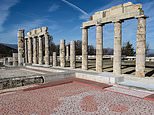
Standing in the vast colonnaded courtyard, where 4,000 Greeks proclaimed 20-year-old Alexander, King of Macedon in 336 BC is an almost unfathomable thrill. Especially when you have the place practically to yourself.
Alexander The Great’s palace in ancient Aigai, modern Vergina, is now welcoming visitors after years of painstaking repairs. I stroll through the empty theatre where Alexander’s father, Philip II, was murdered by a bodyguard at the wedding of his daughter Cleopatra.
His bereaved son was crowned soon after in the sprawling palace where I’m standing. It’s the largest surviving building from the classical Greek period, at 15,000 square metres.
But, because it’s in unfashionable northern Greece, far from the tourist hotspots of Athens and the holiday islands, it’s wonderfully empty.
My only companions are the lines of Doric and Ionic columns, re-erected for the first time in 2,200 years, after the Romans toppled them in the second century BC. Behind me are the snow-capped peaks of the Pierian Mountains. Below me is the Macedonian plain, with its grids of peach trees.
Restored: The Palace of Aigai has reopened after years of repairs. Harry Mount takes a look around, writing: ‘Standing in the vast colonnaded courtyard, where 4,000 Greeks proclaimed 20-year-old Alexander King of Macedon in 336 BC is an almost unfathomable thrill’
The palace, an hour by car from Thessaloniki, is the largest surviving building from the classical Greek period, at 15,000 square metres
Harry reveals that the renovation ‘is all part of a campaign to lure tourists to northern Greece’
Alexander the Great (356-323 BC) was Alexander the Greatest – the most triumphant leader ancient Greece ever saw. He headed east through modern Turkey, beating Darius III, King of Persia. He marched into Egypt and even as far as India, winning every battle. He died, aged just 32, in Babylon.
Alexander is still the number one hero here. His palace was reopened this month by Greek PM, Kyriakos Mitsotakis. In Greece’s second largest city, Thessaloniki – an hour by car from the palace – a mighty statue of Alexander on his beloved horse, Bucephalus, rears up over the promenade by the Aegean Sea.
Even in Thessaloniki railway station, a bronze bust of Alexander has pride of place. You can see why Greeks revere the palace today. I wander through dining rooms where Alexander held symposia – drinking parties where they discussed philosophy. He was taught by Aristotle, Greece’s finest philosopher, and was devoted to Homer’s Iliad.
In Thessaloniki a mighty statue of Alexander on his beloved horse, Bucephalus, rears up over the promenade by the Aegean Sea (above)
Intricate mosaic floors – showing goddesses, flowers and winged creatures – survive, as does a sanctuary devoted to Heracles, the Greek strongman hero, son of Zeus, supposedly Alexander’s ancestor. After its destruction by the Romans, the palace became a quarry. It was rediscovered in the 1970s but remained a wreck. In 2007, it closed for this spectacular renovation.
The palace was largely built by Alexander’s father in the mid-4th century BC – and you must see his buried tomb, a five-minute drive away. You descend beneath a tumulus of earth to reach the tomb, only discovered in 1977.
Philip’s remains and those of one of his queens were found behind a marble door, with his gold crown and gold wreath of oak leaves – the height of Greek craftsmanship, plus tiny ivory busts of Philip II and Alexander.
The tomb of Alexander’s father, Philip II, is a five-minute drive from the palace. ‘You descend beneath a tumulus of earth to reach the tomb, only discovered in 1977,’ writes Harry
The renovation is all part of a campaign to lure tourists to northern Greece. It’s long overdue. Not just Vergina but Thessaloniki contain some of the world’s finest treasures.
Thessaloniki is well-equipped with hotels and restaurants. The Excelsior is an elegant, classical hotel, but modern with modest prices.
Thessaloniki was a vital Roman city. The Roman forum survives, as do 4th-century AD walls circling the city. Two mammoth buildings from AD 300 – the Arch Of Galerius and Rotunda – were built to honour the emperor Galerius (AD 258-311).
These mighty fragments of ancient northern Greece should be much better known – as should Alexander The Great’s palace.
Source link
CHECK OUT: Top Travel Destinations
READ MORE: Travel News



